Koizumi’s Change-Up
Koizumi's Change-Up
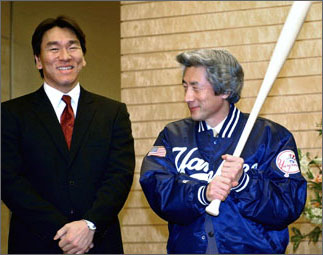
WASHINGTON: After ten years of economic stagnation and policy sclerosis, many in the United States and Europe have begun to dismiss politics in Japan has having little meaning for global markets. Even with the Japanese economy beginning to stir, Prime Minister Junichiro Koizumi's recent cabinet change-up struck some Western observers as too little, too late.
A closer look reveals just how far Koizumi's Japan has come – and how much further it might go – in returning Japan to its role as a major player. Thanks to Koizumi, Japan is likely to exceed both the United States and Europe as an engine for global economic growth this year.
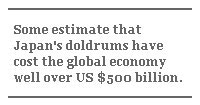
Certainly, Japan can be slow to change. Japan's lost decade saw the economy actually shrinking by 5 percent between 1997 and 2002. Through the mid-90s, the country sought to spend and export its way out of recession. Massive public works projects and protectionist stonewalling kept Japan from facing hard choices needed to compete abroad. A highly leveraged banking system, anchored in the infirm Postal Savings Bank, threatened a collapse that could have catastrophic effects on the world economy.
Short of collapse, Japan contributed little to global growth. Some estimate that Japan's doldrums cost the global economy well over US$500 billion. The world's second largest national economy became an afterthought. Fred Bergsten of the Institute for International Economics called on the U.S. and EU to form a "G2" for governing world finance. Worse yet, a decade later, many in Japan remain perfectly happy being isolated from world affairs.
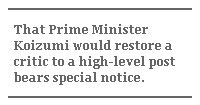
Koizumi faces an uphill battle, but it would be a mistake to sell the Prime Minister short. The "Lion King," as he is known in Japan for his white-flecked mane, has pushed hard at the Liberal Democratic Party (LDP) old guard by installing supporters of his reform agenda. Japan has begun to register real economic growth. Economic forecasters project the economy to grow over 4 percent in 2004, and at least 3 percent in 2005 and possibly even 2006.
Much of the credit goes to two "Koizumi reformers." Two years ago, his Financial Services Minister, Heizo Takenaka, began to force Japanese banks to swallow their non-performing loans. Earlier this summer, Takenaka announced an equally dramatic plan to break up and privatize the Postal Savings Bank. Likewise, Koizumi's Central Bank Governor Toshihiko Fukui has exceeded expectations. Since taking office in early 2002, he has consistently stuck with a zero interest rate policy that is finally paying dividends, so to speak.
Koizumi's latest shake-up added more reformers to cabinet. Signs indicate that trade policy will be his next target. If he succeeds, the benefits will fall not just to Japan.
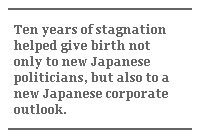
Koizumi's new choice for LDP chief, Tsutomu Takebe, sends a loud signal to party regulars: reform of agriculture is on the way – with big potential consequences for global and regional trade talks. Last year, at a policy symposium in Tokyo held by the Keidanren (the Japanese Business Federation), Takebe began to publicly criticize the Koizumi cabinet for not going far enough on cutting farm tariffs. Takebe himself had been Koizumi's agriculture minister until September 2001, but was forced out by protectionist LDP forces after his pro-market policies were blamed for Japan's sole case of mad cow disease that year.
After a period of respectable exile, Takebe directly took on the farm lobby – particularly for blocking progress in two key trade talks. In his telling, Japan's refusal to lower its 400 percent tariffs on rice undermined the WTO negotiations in Cancun. Takebe also blamed politically powerful pork farmers for the breakdown of bilateral trade talks with Mexico last summer. That Koizumi would restore a critic to a high-level post bears special notice.
The new foreign minister, Nobutaka Machimura also has developed a reputation in Japan as a trade reformer. Even before joining the cabinet, he began to take his show on the road. Earlier this year, at a meeting of the Trade and Poverty Forum in Brussels, he joined 40 other parliamentarians, business leaders, and NGOs -- a diverse group that includes former US Treasury Secretary Robert Rubin and Oxfam International head Jeremy Hobbs -- to call for an urgent three-part plan to end global poverty. In addition to ending farm protections, the group called for increased development aid and tough political reform measures in the developing world. Machimura did this while publicly stating that there was no obvious political incentive to do so – particularly as it went beyond the stated position of the Koizumi government. Why the ambitious posturing?
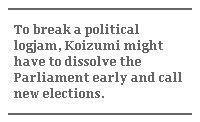
In addition to pushing forward Koizumi's own broad reform rhetoric, both Machimuri and Takabe reflect the growing voice of Japanese businesses. Ten years of stagnation helped give birth not only to new Japanese politicians, but also to a new Japanese corporate outlook. During the lost decade, a few Japanese globally competitive companies, such as Toyota Motors, urged political leaders to understand that the country can only gain from trade if it is willing to open its own markets to foreign goods – including from developing nations, and especially in agriculture.
Toyota began opening overseas assembly plants at a rapid pace, with more than half of their cars now made outside of Japan. And when these plants – such as in Mexico and in China – began to face trade barriers on essential parts still made in Japan, the companies began to listen to what developing countries wanted: greater access to Japan's markets in agriculture, basic manufactured goods, and services – including allowing more foreign workers.
Hence the push for bilateral trade deals. Japan has initiated trade talks with Singapore and Thailand, and has even raised the prospect of an ASEAN free trade area. Likewise, the Koizumi government recently revived and completed the Mexico talks that had stalled last September. Koizumi also has tried to resolve disputes, such as the spat with China over Japanese "safeguard measures" against import surges in gourmet onions and mushrooms, which prompted China to retaliate against Toyota's growing sales on the mainland.
To be sure, Japanese reformers face many obstacles to getting the country to look outward. Much of the bureaucracy still fear change. For instance, several appointees have threatened resignation rather than support postal reform. The Parliament and local party bosses still hold key levers of power, and to break the logjam, Koizumi might have to go through with his risky threat to dissolve the Parliament early and call new elections. Efforts to attract foreigners to the starved labor force also lag, despite entreaties from Japanese businesses. Reflecting public ambivalence, this week an immigration advisory panel to the Foreign Minister made weak recommendations for bringing more new blood to Japan.
In the face of this opposition, Koizumi deserves great credit for fighting for a new Japanese mindset. When visiting New York last month, he donned a satin-blue jacket and threw out the first pitch at Yankee Stadium. His catcher was Japan's greatest living baseball player, Hideki Matsui -- only the most recent Japanese employee willing to work abroad. These are the faces of a Japan fighting to open itself to the world.
William Antholis is Director of Strategic Planning at the Brookings Institution.